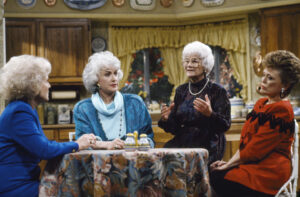
The Golden Girls is celebrated for its groundbreaking approach to comedy, tackling issues such as aging, friendship, and social taboos with humor and grace. However, one particular episode has sparked controversy and even led to its ban from streaming platforms, raising questions about censorship, the evolution of societal norms, and the legacy of the beloved sitcom.
A Brief Overview of The Golden Girls

Premiering in 1985, The Golden Girls quickly became a cultural phenomenon. The series followed four older women—Dorothy, Rose, Blanche, and Sophia—living together in Miami. With its sharp wit and heartfelt storytelling, the show resonated with audiences, offering a fresh perspective on the lives of women in their golden years. It tackled various social issues, including sexuality, racism, and mental health, often with a comedic twist.
The chemistry among the cast—Bea Arthur, Betty White, Rue McClanahan, and Estelle Getty—was palpable, contributing to the show’s success. Over its seven-season run, The Golden Girls garnered numerous awards and remains a beloved classic, celebrated for its humor and relatability.
The Controversial Episode: “The Case of the Libertine Beliefs”
Among the episodes that sparked significant debate is “The Case of the Libertine Beliefs,” which aired during the series’ seventh season. In this episode, the storyline revolves around a character who is diagnosed with HIV. At the time of its airing in the early 1990s, the episode addressed the stigma surrounding HIV/AIDS, a topic that was often shrouded in fear and misinformation.
While the episode aimed to promote understanding and compassion, it also contained elements that some viewers found problematic. Critics argued that certain jokes and portrayals perpetuated stereotypes and contributed to the stigmatization of those living with HIV/AIDS. The episode’s handling of such a sensitive subject matter led to backlash, prompting discussions about the appropriateness of its content.
Censorship and the Ban
In recent years, as streaming services have become the primary platform for watching classic television, the episode in question has been notably absent from many libraries. The decision to ban “The Case of the Libertine Beliefs” from streaming platforms has reignited conversations about censorship and the responsibility of content creators to address sensitive topics thoughtfully.
Proponents of the ban argue that the episode’s humor, particularly in the context of HIV/AIDS, may not align with contemporary values and understanding of the disease. They believe that removing the episode from circulation is a way to protect viewers from potentially harmful stereotypes and outdated representations.

On the other hand, critics of the ban argue that censoring content from the past removes the opportunity for learning and growth. They contend that The Golden Girls was a product of its time, and while not every joke may hold up today, the show’s overall message of love, acceptance, and friendship remains relevant. They believe that confronting these episodes can lead to meaningful discussions about progress and societal change.
The Evolution of Societal Norms
The controversy surrounding the banned episode highlights the evolution of societal norms and the ongoing dialogue about representation in media. In the 1980s and 1990s, the conversation surrounding HIV/AIDS was fraught with stigma and misinformation. The Golden Girls attempted to address these issues with humor, but the nuances of comedy often complicate the portrayal of sensitive topics.
As society has progressed, the understanding of HIV/AIDS has evolved significantly. Education and advocacy have played crucial roles in dismantling stereotypes and promoting awareness. However, the shadow of stigma still lingers, making it essential for media representations to be responsible and informed.
The Legacy of The Golden Girls
Despite the controversy, The Golden Girls remains a significant cultural touchstone. The show’s ability to address important issues with humor and heart is part of what has endeared it to audiences for decades. It has inspired countless spin-offs, merchandise, and even a resurgence of interest in the stories of older women in media.
The legacy of the show also includes the impact it has had on discussions about aging, friendship, and the challenges faced by women. Its willingness to tackle difficult subjects has paved the way for future shows to explore similar themes, albeit with a more contemporary lens.
A Call for Contextualization
Rather than banning episodes outright, some advocates suggest a more contextualized approach. Adding disclaimers or discussions before sensitive episodes could provide viewers with the historical context necessary to understand the content. This method allows for the preservation of classic television while also acknowledging the growth in societal understanding.
By offering context, streaming platforms could encourage viewers to engage critically with the material, fostering discussions about how far society has come and the work that still needs to be done. This approach can empower audiences to appreciate the cultural significance of shows like The Golden Girls while also recognizing the importance of sensitivity in representation.
Conclusion: Navigating the Past and Present
The controversy surrounding the banned episode of The Golden Girls raises important questions about censorship, representation, and the evolution of societal norms. As the show continues to resonate with new generations, it is crucial to engage with its content thoughtfully.
Rather than erasing parts of television history, acknowledging the complexities of past representations can lead to deeper conversations about progress, understanding, and compassion. The Golden Girls remains a beloved classic, and its legacy is not just in its humor but also in its willingness to tackle the issues that matter. As we reflect on its impact, we are reminded of the importance of dialogue and the need to create media that reflects the diversity and complexity of the human experience.
